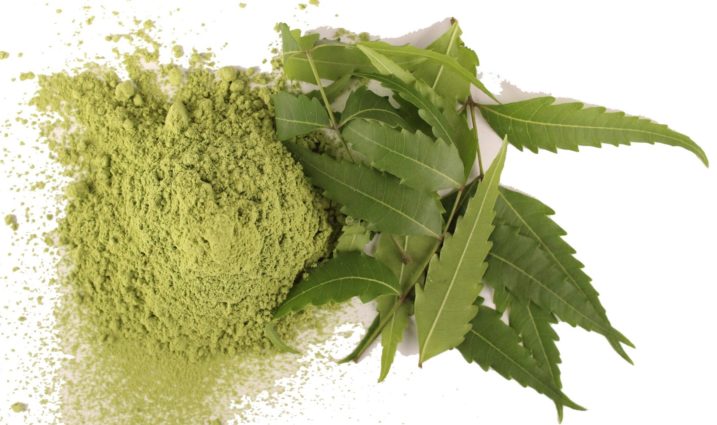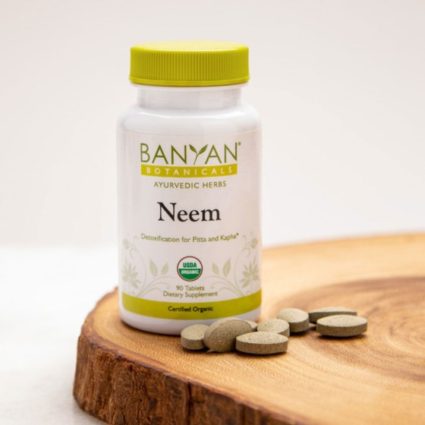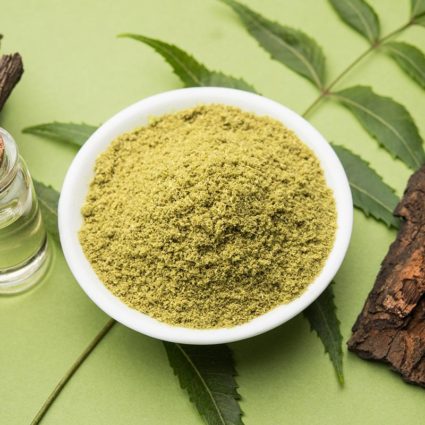
(Neem)
Neem is one of the most powerful Ayurvedic remedies for detoxifying and purifying the blood. It is a strong antipyretic, a natural antibiotic, and antiseptic. Neem reduces fever, eliminates toxins that accumulate in the body in inflammatory skin diseases, ulcers of the mucous membranes, fungal diseases, and non-healing wounds. Neem also has a general anti-aging effect. Neem (Neem) also has an antitumor effect, reducing both benign and malignant tumors.
In addition, neem is an effective remedy for the treatment of skin diseases, such as neurodermatitis, psoriasis, furunculosis, eczema, urticaria. Turmeric and neem leaf masks are a traditional skin rejuvenation treatment. Neem oil with neem extract or neem paste is used externally to treat skin diseases, heal wounds, burns, and insect bites as an antidote.
Neem is recommended for heart and vascular diseases, hypertension, and in the complex therapy of cleansing and weight loss. Neem is recommended to improve the condition of blood vessels, as it reduces the level of cholesterol in the blood and prevents the development of atherosclerosis.
External use of Neem powder (Neem): dilute a small amount of the powder with water and apply it to the problem areas. After 5-10 minutes, rinse with water.
The effect of Neem powder on the body when applied externally: The Neem powder mask is used for oily, porous skin, acne. It is effectively used for the prevention of exacerbations and in the complex treatment of neurodermatitis, psoriasis, eczema, urticaria, boils.

Ingestion of Neem powder or capsules:
It is usually recommended to take 1 capsule twice or three times a day. The supplement should be used half an hour before meals in the morning or 2 hours after dinner. The remedy should be washed down with water or green tea. The course of therapy is 2-3 weeks.
For prevention, take 1-2 capsules per day. In this case, the course is 3 months.
The product should not be used in the elderly and children, as well as in cases of exhaustion.
Method 1. Brew 1/2-1 tsp of powder with a glass of boiling water and after 10-15 minutes, when the water has cooled to an acceptable temperature, drink. If the taste of the supplement is too unpleasant for you, you can add a spoonful of honey.
Method 2. Put 1/2 to 1 tsp of the powder on your tongue and wash it down with warm water (be careful not to inhale the powder).
The effect of Neem powder on the body when used orally: Cleanses the blood, removes toxins, foreign proteins, excess cholesterol, and free radicals. Anti-aging effect. It has pronounced antiseptic properties against a number of protozoa and parasites.

A few concepts
Before we talk about the beneficial properties of this plant, we will make a small excursion into the terminology and concepts of Ayurveda. Ayurveda considers plants from the standpoint of energy. All plants are classified by properties such as taste (race). It can be sweet, sour, salty, astringent, bitter, or spicy. Each taste is formed by two elements. Sweet is made up of earth and water, sour is made up of earth and fire, bitter is made up of air and ether, sharp is made up of fire and air, and astringent is made up of earth and air.
In addition to the taste, the thermal effect of the plant is important, namely, their ability to warm or cool (virya). Vipak-the effect that plants have after digestion. Vipak reduces the six flavors to three: sweet, sour, and spicy. The classification also takes into account the ability of herbs to dry or moisten, as well as properties such as lightness and heaviness. The taste of the plant, vipak, and virya have a specific effect on the body, on all three doshas. And, accordingly, they determine the place of the plant in the treatment of various diseases.
Bitter tonics
Neem (Neem) belongs to the group of bitter tonics. The bitter taste, consisting of ether and air, is the coldest and driest. Therefore, the word “tonic” is not used herein in the classical Western sense. Bitter herbs can dry up tissues and vital juices and can cause muscle spasms. They are rarely prescribed to chronic and debilitated patients.
Bitter tonics are designed to reduce excess, cleanse the body of toxins, and not make up for any deficiency. They are used in cleansing, antipyretic therapy, with sedative purposes. In small amounts, bitter herbs stimulate digestion, mainly in patients suffering from fever and an excess of Pitta.
Bitter tonics are indicated for feverish conditions. They don’t just eliminate the fever, they eliminate the infection that caused the disease. They destroy the Ama, so they are indicated for any fever caused by the accumulation of Ama (arthritis such as Vata and Kapha, colds).
By reducing the heat, they reduce intoxication, cool the blood, and purify the toxins. In addition to this, they improve metabolism, regulate liver function, and reduce bile production. They are indicated for jaundice, hepatitis, and diabetes. Regulate the metabolism, reduce the amount of fat, reduce weight.
Neem (Neem) – a fast-growing spreading tree belonging to the breed of black trees.
It reaches a height of up to 30 meters. Neem (Neem) has dark green elongated leaves, blooms with fragrant white flowers. It begins to bear fruit in the third year and produces a huge crop of olive-shaped fruits with thin skin and white flesh. Its homeland is India and nearby Asian countries. It was taken out of there and subsequently adapted well in the tropics and semi-tropics on almost all continents. Neem is a unique, magical tree. The word “nim, nimbus “means” giving health”. The Hindus call it “the sacred tree”, “the village pharmacy”, “the panacea for all diseases”. In the countries where the Neem tree grows, it is present in almost all areas of human life. Neem is used for landscaping, for strengthening the soil, for pest control, as fertilizers in agriculture, in everyday life, and, most importantly, in medicine.
Additional information:
Neem (Neem), melia persia, azadirachta Indica, melia azadirachta, (Latin), neem, India lilac, paradise tree, holy tree, white cedar, margosa tree, Crack Jack( English), neem, nimm, nimba, arishta (Indus) Neem (also known as neem, margosa, or Azadirachta indica, Neem) is one of the most famous medicinal plants in India. The history of its use goes back four thousand years. The leaves and bark of the tree are used for medicinal purposes. The remedy is now sold in the form of powder, capsules, or medicinal oil obtained by cooking the leaves of a tree in vegetable oil (more often sesame).
The material is prepared by specialists for informational purposes only. It should not be used as a guide for the treatment of diseases, and it cannot replace professional medical advice, diagnosis, or treatment. In case of illness or any symptoms, you should not self-medicate and should always consult a doctor.


